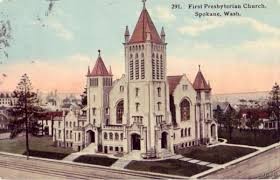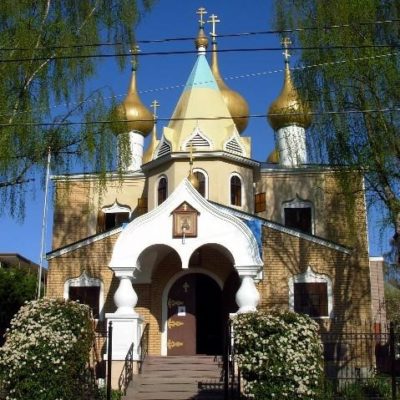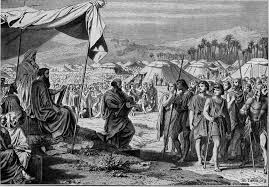The Cumberland Presbyterian Church

The Cumberland Presbyterian Church developed out of the great revival of 1800. They stress evangelism, reject predestination and avoid centralized authority in the church government. They revised the Confession of Faith and included interpretations of predestination that they found acceptable.
There were a majority of the Cumberland Presbyterian that revisited the interpretations of predestination and once again rejoined the Presbyterian Church in the U.S.A. in 1906. Those who rejected the merger elected to continue to call themselves the Cumberland Presbyterian Church and have its headquarters in Memphis, Tennessee.
The Cumberland Presbyterian Theological Seminary is located at Memphis, Tennessee; Bethel College is located at McKenzie, Tennessee.
History
The Cumberland Presbyterian Church developed out of the great revival of 1800, also called the Great Awakening on February 4, 1810 in Dickson country, Tennessee.
The founders of the church were Finis Ewing, a Presbyterian minister, Samuel King and Samuel McAdow. They organized on February 4, 1810 in Dickson country, Tennessee. These three rejected the doctrine of the “Westminster Confession of Faith” and the rigid standards of the Presbyterian Church for the education of the clergy. They wanted the standards relaxed because of the problems experienced on the American frontier.
Because of the shortage of ordained ministers in the Kentucky area, the Presbyterian Church had ordained men to minister to the Church in Kentucky. The Kentucky Synod deemed these men unqualified to be ministers because of their lack of education. It was in 1806 when the Kentucky synod dissolved the Cumberland Presbytery. Some of the ministers that were rejected by the Kentucky Synod organized the Independent Cumberland Presbytery and which grew into the Cumberland Presbyterian Church in 1810.
Finis Ewing was born July 10, 1773 and died July 4, 1841. He was the primary founder of The Cumberland Presbyterian Church denomination on February 4, 1810. Finis Ewing was one of the principal ministers of the Great Revival that took place on the American frontier in the early 1800. The Kentucky Synod turned against the revival movement in favor of higher educated ministers prior to their ordination. The American frontier protested the Kentucky Synod decision because of their tremendous needs.
Finis Ewing served as the council of Revival Ministers from 1805 to 1810. He tended to his congregations as best as he could and attempted to reconcile with the Presbyterian Church. Along with Samuel McAdow and Samuel King Ewing, he established an independent Cumberland Presbytery on February 4, 1810.
Samuel King was born April 19, 1775 in Iredell County, North Carolina and died in Missouri in the fall of 1842. Samuel was selected by Reverend David Rice who was one of the oldest Presbyterian Minister in Kentucky. He had seen the impoverished congregations in Tennessee and recommended the most devout young men should be encouraged to prepare themselves to become minister. Samuel King was one of the first ones selected. These young men could not go through the ordinary process of education that was required by the Presbyterian Church because the need for their services was so great on the American frontier.
Samuel King believed his calling was from God. The revival ministers encouraged Samuel King to prepare written discourses and present them before the Transylvania Presbytery in October, 1801. Along with Finis Ewing Samuel King was licensed as probationers for the ministry in the fall of 1802.
The Kentucky Synod sessions were held in 1802 which divided the Transylvania Presbytery and formed the Cumberland Presbytery.
Samuel King was set apart to the work of the ministry in June, 1804. It took three ministers to constitute a Presbyter. Finis Ewing, Samuel King, and Samuel McAdow agreed to organize the old Cumberland Presbytery on February 4, 1810.
Samuel McAdow was born April 10, 1760, in Guilford County, North Carolina. He died on March 30, 1844, in his sleep. His last word to his friend was “All is peace, my work is done, everything is ready; I have nothing to do, but to die; there is no doubt, no fear.” He was almost eighty-four years old when he died.
Samuel became licensed to preach in September 20, 1794 by the Presbytery of Orange.This was the oldest Presbytery in North Carolina. McAdow was ordained somewhere around the fall of 1799. He lost his wife on April 20, 1799, and he decided to travel west. He made plans to move to Kentucky with his little daughter.
He spent his first summer in East Tennessee and preached at Big Limestone Congregation. He continued on to Kentucky and by the spring of 1800, he was preaching regularly at Red River in Logan County and to the Rockbridge congregation in Christian County.
Samuel McAdow married for the second time and had another daughter. His second wife died on May 17, 1804. He left his two little daughters in the care of a sister and continued his commitment to his ministry, extending his preaching territory to the Ohio River and into the State of Tennessee. His health failed because of a weakness of his lung and his physicians advised him to cut back his ministry.
July 1806 he remarried for a third time in Dixon County Tennessee. He had two sons from this marriage. It was while he lived in Dixon that the Cumberland Presbytery was constituted and the Cumberland Presbyterian Church then grew. The transaction took place at his home February 4, 1810, on the banks of the Jones Creek seven miles from Charlotte.
Samuel McAdow sold all his possessions in Dixon and moved to Jackson County in 1815. He did what he could to promote the interests of religion until 1828. Late in the fall of 1828 he moved to Illinois and settled in Bond County. His work has all but stopped due to his old age and infirmities.
June 3, 1839 Samuel lost his third wife. He confined himself to his home he shared with his eldest son and spent his time reading and meditation. The only time he left his home was for an attending the public worship.
Louisa Mariah Layman Woosley The Cumberland Presbyterian Church was the first church to ordain a woman as their minister in 1889. Louisa Mariah Layman Woosley born March 24, 1862 and died June 30, 1952. Louisa Mariah Layman Woosley was ordained by the Kentucky Synod on November 5, 1889 by the Nolin Presbytery. The Cumberland Presbyterian Church didn’t exclude women form being ordained but they did not include them either. This created a huge controversy over the legality of her ordination. The Kentucky Synod instructed the Nolin Presbytery to remove Louisa Woosley from their rolls. They sent her to another presbytery. They Kentucky presbyteries came to the aid of Louisa Woosley and this sympathetic view helped her to outlast the Synod objection to her ordination.
Belief
The Cumberland Presbyterian Church believes in their confession of faith which is two-fold. It provides a means to those who have been saved, redeemed, and reconciled by God through Jesus Christ in the power of the Holy Spirit understand and affirm their faith. Secondly, it bears witness to the saving activity of God. Those who have not been saved, redeemed, and reconciled might believe in Jesus Christ as Lord and Savior and experience salvation. It is for this end the confession of faith is an affirmation of truth.
The Cumberland Presbyterian Church believes God alone is Lord of the conscience. The right of judgment of religion is universal and inalienable.
They do not believe any religious organization should be aided by civil power.
The Cumberland Presbyterian Church believes in God as the only true and living Father, Son and Holy Spirit. They believe God speaks through the Holy Scriptures. The Holy Scripture is Jesus Christ, the Word made flesh.
They believe God is the creator of all that is known and unknown. They believe creation reveals the glory, love, wisdom, beauty and goodness of God. They believe in the sight of God, male and female are created equal and complementary.
The Cumberland Presbyterian Church believes all testimony to Jesus Christ must be tested by Scriptures. Scripture is believed to be the only unfailing and authoritative word for Christian faith, growth and practice. They believe God inspired people of the covenant community to write Scripture. Scripture speaks about sin, judgment, salvation, creation, the church and growth for the believers. The Cumberland Presbyterian Church believes the Holy Scripture should be understood and speaks of the birth, life, and resurrection of Jesus of Nazareth.
They believe God gives moral laws to govern human actions and relations. They believe moral laws are gifts of the grace of God and the judgment of God is the moral laws upheld. They believe moral laws are fulfilled in the gospel and the behavior of Christians should reflect the pattern of God’s behavior toward them. The Cumberland Presbyterian Church believes the purpose of moral laws is to create wholeness in the physical, spiritual, mental and social life and gives humans integrity of life.
The Cumberland Presbyterian Church believes people are given the capacity and the freedom to respond to the divine grace of God in loving obedience. They believe whoever is obedient will be saved. They believe people are responsible for their actions and choices toward everything they do. The Cumberland Presbyterian Church believes in willful disobedience Adam and Eve they disrupted the community with God. They believe all people who rebel against God will lose their relationship to God and they become slaves to sin and death. They believe all who willfully sin become guilty before God and are under divine wrath and judgment. They believe only the saving grace of God through Jesus Christ.
The Cumberland Presbyterian Church believes Jesus Christ is the new covenant and the eternal Word made flesh and is the covenant of grace. They believe the promises, prophecies, sacrifices and the Passover Lamb were delivered to the Israelites. They believe the Holy Spirit instructed people in the knowledge of God and lead them to believe in God. They further believe the covenant of grace since the coming of Christ is successful through the preaching of the word, administrating the sacraments of baptism and the Lord’s Supper. The Cumberland Presbyterian Church believes all those who are united to Christ by faith and are united to one another in love.
The Cumberland Presbyterian Church believes sacraments are the sign and testimonies of the covenant of God’s grace. They believe circumcision and Passover are the sacraments of the Old Testament; the sacraments of the New Testament are Baptism and the Lord’s Supper. They believe water Baptism symbolizes the baptism of the Holy Spirit and is the outward sign of the covenant. This is believed to be a witness to God to claim the persons of Christ, give forgiveness of sins, grant them grace and shapes their lives through the work of the Holy Spirit. They believe in infant baptism by allowing one or both of the parents affirm faith in Jesus Christ and take the responsibilities of the covenant. They use water which is either poured or sprinkled as they Baptize in the name of the Father and the Son and the Holy Spirit. They do not believe Baptism is an essential part of salvation nor apart from life in Christ and the church.
The Cumberland Presbyterian Church believes the Lord’s Supper was instituted by Jesus Christ on the night of his betrayal. They believe it is done in remembrance of the passion and death of Christ on the cross. The bread and the fruit of the vine represent the body and blood of Christ. They do not believe in worshipping the bread and the fruit of the vine. They do believe it represents the passion and death of Christ.
The Cumberland Presbyterian Church believes justification is the act of loving acceptant of God where people are reconciled to Him by the life, death and resurrection of Jesus Christ. They believe when people are repentant and have faith to trust Christ then God gives them peace and restores their relationship with Him.
The Cumberland Presbyterian Church believes believers are saved by grace through faith which generates the desire to do good works for which God creates persons in Christ Jesus. They believe they are done in thankful response to the gift of grace of God. They believe good works are the result of and not the means of salvation.
Cite Article Source
MLA Style Citation:
Holstein, Joanne “The Cumberland Presbyterian Church:.” Becker Bible Studies Library Jan 2006.<https://guidedbiblestudies.com/?p=2668,>.
APA Style Citation:
Holstein, Joanne (2006, January) “The Cumberland Presbyterian Church:.” Becker Bible Studies Library. Retrieved from https://guidedbiblestudies.com/?p=2668,.
Chicago Style Citation:
Holstein, Joanne (2006) “The Cumberland Presbyterian Church:.” Becker Bible Studies Library (January), https://guidedbiblestudies.com/?p=2668, (accessed).


